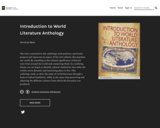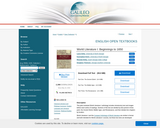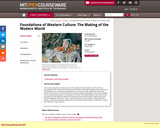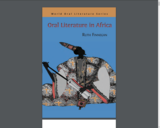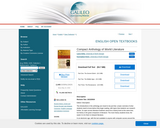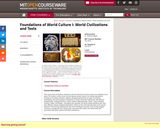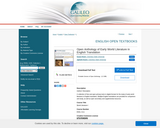Ruth Finnegan’s Oral Literature in Africa was first published in 1970, and since then has been widely praised as one of the most important books in its field. Based on years of fieldwork, the study traces the history of storytelling across the continent of Africa.
This revised edition makes Finnegan’s ground-breaking research available to the next generation of scholars. It includes a new introduction, additional images and an updated bibliography, as well as its original chapters on poetry, prose, "drum language" and drama, and an overview of the social, linguistic and historical background of oral literature in Africa. Oral Literature in Africa has been accessed by hundreds of readers in over 60 different countries, including Ethiopia, Kenya, Rwanda and numerous other African countries.
Other formats available here: https://www.openbookpublishers.com/product/97
Table of Contents:
I • INTRODUCTION
1. The 'oral' nature of African unwritten literature
The significance of performance in actualization, transmission, and composition. Audience and occasion. Implications for the study of oral literature. Oral art as literature.
DOI: 10.11647/OBP.0025.01
2. The perception of African oral literature
Nineteenth-century approaches and collections. Speculations and neglect in the twentieth century. Recent trends in African studies and the revival of interest in oral literature.
DOI: 10.11647/OBP.0025.02
3. The social, linguistic, and literary background
Social and literary background. The linguistic basis — the example of Bantu. Some literary tools. Presentation of the material. The literary complexity of African cultures.
DOI: 10.11647/OBP.0025.03
II • POETRY
4. Poetry and patronage
Variations in the poet's position. Court poets. Religious patronage. Free-lance and wandering poets. Part-time poets. A note on 'epic'.
DOI: 10.11647/OBP.0025.04
5. Panegyric
Introductory: nature and distribution; composers and reciters; occasions. Southern Bantu praise poetry: form and style; occasions and delivery; traditional and contemporary significance.
DOI: 10.11647/OBP.0025.05
6. Elegiac poetry
General and introductory. Akan funeral dirges: content and themes; structure, style, and delivery; occasions and functions; the dirge as literature.
DOI: 10.11647/OBP.0025.06
7. Religious poetry
Introductory. Didactic and narrative religious poetry and the Islamic tradition; the Swahili tenzi. Hymns, prayers, and incantations: general survey; the Fante Methodist lyric. Mantic poetry: Sotho divining praises; odu Ifa (Yoruba).
DOI: 10.11647/OBP.0025.07
8. Special purpose poetry — war, hunting, and work
Military poetry: Nguni; Akan. Hunting poetry: Yoruba ijala; Ambo hunters' songs. Work songs.
DOI: 10.11647/OBP.0025.08
9. Lyric
Occasions. Subject-matter. Form. Composition.
DOI: 10.11647/OBP.0025.09
10. Topical and political songs
Topical and local poetry. Songs of political parties and movements: Mau Mau hymns; Guinea R.D.A. songs; Northern Rhodesian party songs.
DOI: 10.11647/OBP.0025.10
11. Children's songs and rhymes
Lullabies and nursery rhymes. Children's games and verses; Southern Sudanese action songs.
DOI: 10.11647/OBP.0025.11
III • PROSE
12. Prose narratives I. Problems and theories
Introductory. Evolutionist interpretations. Historical-geographical school. Classification and typologies. Structural-functional approach. Conclusion.
DOI: 10.11647/OBP.0025.12
13. Prose narratives II. Content and form.
What is known to date: content and plot; main characters. Types of tales: animal stories; stories about people; 'myths'; ‘legends' and historical narratives. What demands further study: occasions; role of narrators; purpose and function; literary conventions; performance; originality and authorship. Conclusion.
DOI: 10.11647/OBP.0025.13
14. Proverbs
The significance and concept of the proverb. Form and style. Content. Occasions and functions. Specific examples: Jabo; Zulu; Azande. Conclusion.
DOI: 10.11647/OBP.0025.14
15. Riddles
Riddles and related forms. Style and content. Occasions and uses. Conclusion.
DOI: 10.11647/OBP.0025.15
16. Oratory, formal speaking, and other stylized forms
Oratory and rhetoric: Burundi; Limba. Prayers, curses, etc. Word play and verbal formulas. Names.
DOI: 10.11647/OBP.0025.16
IV • SOME SPECIAL FORMS
17. Drum language and literature
Introductory — the principle of drum language. Examples of drum literature: announcements and calls; names; proverbs; poetry. Conclusion.
DOI: 10.11647/OBP.0025.17
18. Drama
Introductory. Some minor examples: Bushman 'plays'; West African puppet shows. Mande comedies. West African masquerades: South-Eastern Nigeria; Kalabari. Conclusion.
DOI: 10.11647/OBP.0025.18
